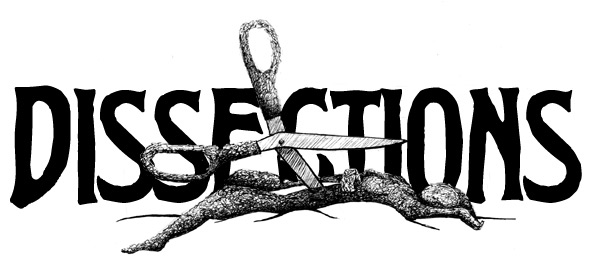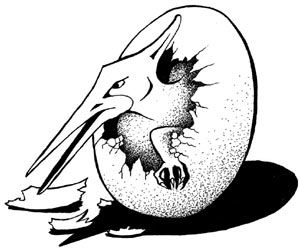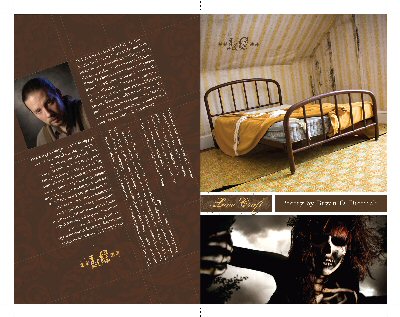[an error occurred while processing this directive]




Artwork: Courtesy of Finishing Line Press
Review of Bryan D. Dietrich’s Love Craft
Gina Wisker
Bryan Dietrich’s poems are lambent, insinuating, delicately threatening. His control of language is fine and measured, the danger, loss and desire subtly intertwined, the stuff of relished nightmare. This is a sensitive book, testimony to the enormity of the loss of his father, imaged in the pulp scifi, horror, comic book, film images they shared. Domestic horror merges with details of damage. Only Bryan would rhyme ‘shudder, larder, murder’.
When people suggest that you cannot make poetry out of horror or
science fiction, point them in the direction of Bryan Dietrich. His
poetry is finely crafted and he uses the atmospheric settings, events,
and trajectories of related fantasy genres in which to locate his
explorations about human values, experiences, sensitivities, hopes
and losses (among others). His website gives us some background: Bryan
lives in Wichita, Kansas with his wife Gina and their son Nick. A
Professor of English at Newman University, he has won the Paris
Review Prize, the ‘Discovery’/The Nation
Award, a Writers at Work Fellowship, a Rhysling Award, the Isotope
Editor’s Prize and the Eve of St. Agnes Award. His poetry has
appeared in The New Yorker, The Nation, Poetry,
The Paris Review, The Harvard Review, The Yale
Review, Shenandoah, Weird Tales, and Asimov’s
Science Fiction. His first book of poetry, Krypton Nights
(2002), was followed by Universal Monsters, from Word Press.
The Assumption is coming out from Word Press in 2009 and
Love Craft is published by Finishing Line Press in January
2010.
On his website Bryan admits to growing up enjoying watching classic
horror movies and there is much recollection of the shared joys of
this in Love Craft. He has been described as ‘imaginatively
resourceful and mercurial’ (Bruce Bond, 2009). There’s
all of that in this new book and a lot more that’s very personal,
as if Bryan is exorcising many of his personal demons as well as exploring
and casting new light on memories of growing up and adulthood, and
a more settled sense of identity and direction.
The collection starts with a reprinting of ‘Necronomicon’
and then falls into three parts: The Tomb, The Temple
and The Book of the Dead. In The Tomb there is a
range of poems which mainly focus on his history with his father,
their shared enjoyment of James Bond movies, identifying the changes
in the movie hero as similar to those in his own father. ‘The
Nameless City’ begins in the desert and moves into the arid
and uncomfortable family trip as ‘A Brady Bunch special without
any Lovely Lady’ just after his father’s divorce, leading
to decaying relationships, slaps, ennui, dead air, silence, the loss
of love.
In ‘The Whisperer in Darkness’ he admits to ‘furniture
murder’, acknowledging the divisions between him and his father,
yet the obvious leakage of horror into their lives clearly bonded
them. Puncturing the furniture, his father’s chair, with a pen
or a needle is an image from domestic horror but there are familiar
strains of difficult tensions between himself, his sisters and his
father, their relationship with their mother recalling that of his
father with his own mother. There are losses, ties that bind, expressed
in images of horror from Hammer, all too appropriate for recurrent
nightmares and memories; the waking nightmare. He asks:
Why do we need to practice
puncturing hearts? Forgive me, but finally,
what’s at stake? Vampires? Who tends their graves?
I love my father. I love my family. But I could
no more say this in a poem than he could
say it to any of us. He’s always been cold.
He could cut the grass. He could lay down on her
and weep. No one teaches us to be alone.
These are confessional poems inspired by a unique mix of Lowell, Plath and Lovecraft. The breakdowns are present in his mother, rocking darkly on her bed, imagining the aftermath of suicide.
THE LOVED DEAD
I.
My mother has always envied the dead.
One night at supper she explained how
she didn’t want anyone undressing her
after, how she preferred ash to cherry.
Later, when I was nearly ten, she served
notice to my father: I’d do it now, but
what would the kids find? How would they heat up
their breakfast, my nightgown caught in the broiler?
I remember her locked in her room, weeks
at a time. We’d bring her ice water in plastic
cups, dole out her pills for her, make sure her bell
clapper wasn’t strangled in its own chain.
Then the truly black moods, naked, rocking
back and forth on the bed, knees to her chin,
a doll or bear or gnome clutched to her chest.
In the corner, her terrariums, weeping.
Bryan’s demons are all brought out on show here – the relationships between social cultural psychological personal nightmares, memories and managed interpretations (managed because imagined in the terms of horror), which take us on a journey through time which helps to both surface and expose and to manage. Here no-one teaches us to be alone or what to do with loss, betrayal and death.
And the dead are all around, their calling or the living more an avalanche of reminders growing behind the first traces and sounds – reminders as much of the dead as of loss, the past and our own deaths. Perhaps what we have here is partly that sense of capture of the ineffable, the temporary nature of any ordinary everyday event, while the past is disinterred and exposed like his imagined mother’s body in front of medical students, were her body given to science. This and other bodies of the past, the poetry assures us, would be exposed and all around us – beating back, holding back that inevitable continuity of death, life and the world with the stars and ash.
NECROMANCY
Okay, we love the dead. But when do they stop calling?
We left a message, yes, expecting at least a token
response, but not this, not the constant carillon, ring
tones axing us open, tearing us up, interrupting
what dreams we’ve been allowed, spilling sleep
like a thick sick. Stew of all we thought was gone.
Late night, light loitering only in the most unkind
windows, we rise and walk. We pass our photographs,
running fingertips over lips, sometimes theirs, sometimes
our own, the taste of dust bringing back everything
that hadn’t happened yet. We touch our things, old things.
Russian nesting dolls, cracked, wrapped in spider shawls.
These randomly mixed items evoke an ordinary enough household, but there is throughout a continuity evident in everything around us, it seems to say, from death through life to death ahead. Perhaps this stuff of horror enables the recognition and expression of such awareness, so that it is not necessary to rock on the bed in a locked room?
And he moves away from the recall of the rather-too-close-to-home, there is a step back to devise ways of dealing with the extreme, through the strategies of fantasy. This still elides with the tales of domestic damage but the strategies and techniques deal with incest, murder, still births, demon children in the more familiar mode of horror and dark fantasy without the self referencing. Lovecraft’s own domestic horror starts the final section:
BEHIND THE SHUTTERS
From the direction of the shuttered room came...a curious,
choking whimpering that sounded, horribly, like a child
at a great distance trying to call out...
—H. P. Lovecraft
And in here, in ‘I. House’, the text manages the damages done with myth and folktale – Jack and the Beanstalk’s giant, ogres, the building of family and history on hidden suffering and control.
Monsters. Children. Monsters. Parents. Home
sweet-meated home. A family sets its table,
this fable, built bone by infant bone.
The influence on Love Craft is immediate here in the ways
in which siphoning and funneling the demonic horror through Lovecraftian
imagery and location can provide a critical and imaginative focus
distance perspective. It’s a sensitive, powerful, stylistically
sophisticated collection which handles some of the worst versions
of recall and fear through the management of image, language, rhythm,
scenario, and the slippage between memory and nightmare, familiar
domestic folktale, family tale, and horror. There is no getting rid
of the family past, however, and whatever our own versions of these
might be, Bryan reminds us of our love hate relationships with what
has subtly, intrusively or boldly, invasively made us who we are.
We loved them
once. Had to kill them once. Now we want them back.
The dead. The dead and all their hang-ups. (Necromancy)
As he says: ‘Tell. Open the book, brace yourself, say the spell’. (Necronomicon)
(Love Craft is to be published by Finishing Line Press,
January 2010.)